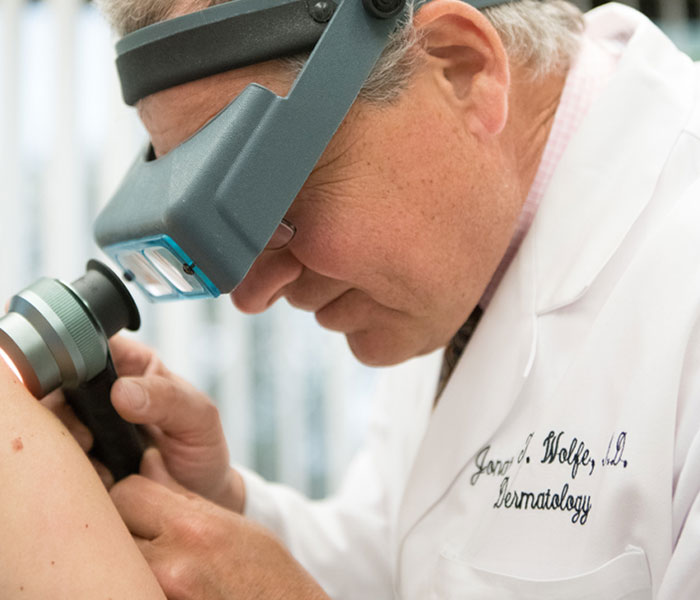Conditions
Identifying Signs of Skin Cancer
Considering that skin cancer is the most common type of cancer, scheduling an annual skin cancer exam is an important part of maintaining optimum health. Skin cancers can be difficult to identify on your own without the proper equipment and can often be confused with benign moles or lesions. Your skin cancer exam will clear up any confusion or concerns with new spots that have appeared on your skin and provides an opportunity for you to discuss skin cancer prevention strategies with your dermatologist.

What to Expect at Your Skin Cancer Exam
Even if you are examining your skin from head-to-toe regularly at home, it is still important to schedule an appointment with your dermatologist once a year for a professional skin exam. If you identify new spots on your skin that are irregular in shape or texture, you should quickly schedule an appointment, even if it has been less than a year since your last skin check.
There's no reason to stress over your skin cancer exam, as the entire process is quick and completely painless. You will be given a gown to wear and asked to point out any worrisome moles or spots you have found during your self-examination. During your exam, your dermatologist will be looking for any signs of skin cancer while a nurse or medical assistant is also in the room.
If There are Suspicious Spots
If your dermatologist identifies any suspicious-looking spots, a biopsy may be completed in your exam room for further examination under the microscope. Depending on the size of the biopsy, a numbing agent may be used to ensure you are comfortable during the short procedure.
Common Symptoms of Skin Cancer
Basal cell and squamous cell carcinomas are the most common nonmelanoma skin cancers. They are usually caused by sun exposure and begin in the top layer of skin.
Basal Cell Carcinoma
As the most common type of skin cancer, basal cell carcinoma presents as a flesh-colored, pearl-like bump or a pinkish patch of skin. It is found most commonly on areas of the body with the most sunlight exposure, such as the head, neck, and arms; however, it can form anywhere on the body. People who have fair skin are at the highest risk of developing this type of skin cancer, although people with darker skin can also develop it.
Squamous Cell Carcinoma
Squamous cell carcinoma is the second most common type of skin cancer. It usually appears as a red firm bump, scaly patch or a sore that heals and then re-opens. Squamous cell carcinomas tend to form on areas of the skin with high sun exposure, such as the rim of the ear, face, neck, arms, chest and back. Similarly to basal cell carcinoma, it most commonly appears in fair-skinned people, but can also develop in darker-skinned people.
How to Identify Signs of Skin Cancer Early
To identify signs of skin cancer early, it is important that you conduct regular self-examinations of your skin. It is recommended that you do a head-to-toe self-examination of your skin once a month in order to be aware of any changes or growths that may appear. You will need to perform your self-examination in a room with bright light, a full-length mirror and a hand mirror.
How to Conduct a Thorough Self-Examination
- Examine your face, including your ears, mouth and lips
- Inspect your scalp (best inspected with the help of a friend)
- Check your hands, including in between your fingers and palms
- Examine your arms, including your wrists, elbows, armpits and shoulders
- Inspect your chest and torso, making sure to check the undersides of breasts
- Use the full-length mirror to check your back, neck, buttocks, genitals and backs of legs
- Examine your feet, including in between your toes and soles
- During your self-examination, you should be looking for signs of skin cancer like:
- A skin growth that changes in size, color or shape over time or appears suddenly
- A mole with an irregular outline or larger than the size of a pencil eraser
- A spot that itches, hurts or bleeds
- An open sore that doesn't heal within three weeks
Get a Professional Skin Exam
If you find a troublesome spot, you should schedule a skin cancer exam as quickly as possible. Keep in mind that skin cancer is highly treatable and curable, so try not to stress. The team at Dermatology Associates of Plymouth Meeting is highly experienced in skin cancer treatment and will ensure that you achieve the best possible care if treatment is required.
Schedule your appointment at Dermatology Associates of Plymouth Meeting for a professional skin check. Many skin cancers can be treated at your appointment in the comfort of our office. We are eager to help you achieve optimal health by reducing your risks of developing skin cancer through prevention, diagnosis and treatment.
